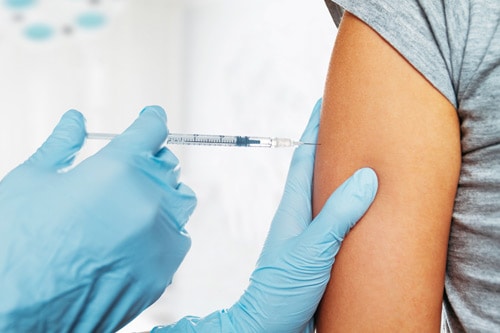
Around 21 million children around the world are missing out on measles vaccinations every year, raising the risk of the disease killing or leaving children disabled for life.
These alarming new figures released by UNICEF show that the problem is growing in high income countries, with the US, France and the UK having the highest numbers of unvaccinated children in the most developed countries over the 2010-2017 period.
In the first three months of 2019, more than 110,000 measles cases were reported worldwide – a threefold rise from the same period last year. An estimated 110,000 people, most of them children, died from measles in 2017, a 22% increase from the year before.
In the 2010-2017 period, 2.59 million children in the US went without a measles vaccination, followed by 608,000 in France and 527,000 in the UK.
The rising numbers of unvaccinated children is attributed to the rise of a ‘vaccine rejection’ trend among some parents in developed countries, including a militant ‘anti-vax’ movement which spreads myths and untruths about vaccine safety.
One of the most notorious figures in the anti-vax movement is Andrew Wakefield, a former British doctor who first raised doubts about the combined measles mumps and rubella (MMR) vaccine in the late 1990s.
His research was eventually found to be fraudulent, but public health campaigners have found it almost impossible to counter the myths spread since then.
The UK remains one of the worst hit among developed nations, with some well-meaning parents believing falsely that vaccinations can ‘overload’ the immune systems of young children.
Simon Stevens, chief executive of NHS England, said: “Getting yourself and your children vaccinated against killer diseases is essential to staying healthy, and vaccine rejection is a serious and growing public health time bomb.”
He called on social media firms such as Facebook and Instagram to do more to block fake news stories and scaremongering about vaccines.
“With measles cases almost quadrupling in England in just one year, it is grossly irresponsible for anybody to spread scare stories about vaccines, and social media firms should have a zero tolerance approach towards this dangerous content.”
Faced with new legislation to compel it and other social media firms to fight fake news, Facebook last month vowed to block anti-vax adverts to stop the spread of medical misinformation.
Two doses of the measles vaccine are essential to protect all children, but UNICEF’s figures show that there is a considerable drop off in children receiving the second dose.
The global coverage of the first dose of the measles vaccine was reported at 85% in 2017, with coverage for the second dose at a much lower level of 67%. The World Health Organisation recommends a threshold of 95% immunisation coverage to achieve so-called ‘herd immunity’ – but many richer nations are also now dipping below this level.
Meanwhile, in low- and middle-income countries, the situation is critical. In 2017, for example, Nigeria had the highest number of children under one year of age who missed out on the first dose, at nearly 4m. It was followed by India (2.9m), Pakistan and Indonesia (1.2m each), and Ethiopia (1.1m).
“The ground for the global measles outbreaks we are witnessing today was laid years ago,” said Henrietta Fore, UNICEF executive director. “The measles virus will always find unvaccinated children. If we are serious about averting the spread of this dangerous but preventable disease, we need to vaccinate every child, in rich and poor countries alike.”




